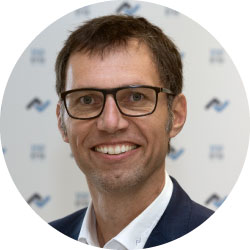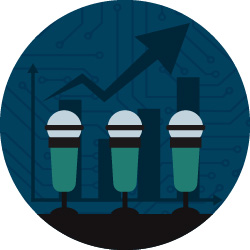- 09:00 - 09:30Sustainable assembly repair - technology and trendsJörg Nolte - Product Manager - KURTZ ERSA

Sustainable business practices are more than just a buzzword – they are gaining ground across large parts of the industry, as they offer competitive advantages on the international stage.
Reworking electronic assemblies helps preserve the value already created and reduces resource consumption by minimizing electronic waste.
Jörg Nolte from Ersa GmbH will highlight the technologies currently used to successfully rework electronic assemblies. The focus will be on gentle and controlled thermal processes for desoldering and soldering partially complex SMD components, techniques for contactless residual solder removal, as well as preparation of the assembly with new solder or flux.
Real-life application examples and tips for tricky cases will round off the presentation, offering experts the opportunity to deepen their knowledge of assembly repair and reflect on challenges from their own applications.
- 09:35 - 10:05Collaboration as the key to the future of the electronics industry: innovative solutions for OEM and EMS companiesFahir Veladzic - CEO and founder - Chipsconnect

The electronics industry faces significant challenges: Global challenges, technological advancements, and inefficient supply chains shape the market. OEM and EMS companies struggle with unequal conditions, high inventory levels, and volatile supply situations, leading to high capital binding and environmental risks.
Fahir Vealdzic will demonstrate through examples how companies can enhance their competitiveness, increase flexibility, and promote sustainability through collaboration and tailored digital solutions. Peer-to-peer trading, transparency, and improved information structures enable companies to operate more efficiently and open new business opportunities.
- 10:10 - 10:55Creating additional value when recycling production waste from PCB, EMS and OEMPeter Kolbe - CEO - MPM Environment Intelligence GmbH

Improper disposal of e-waste may lead to significant environmental problems. The release of chemicals and heavy metals may also endanger ecosystems and, consequently, human health. In response to ecological damage, the Europeans enacted strict laws and regulations to ensure correct recycling and disposal of e-waste. On the one hand these regulations are supposed to prevent illegal waste shipment and on the other hand to enhance the recycling rate thus to assure future raw material supply.
What does this precisely mean for European producers?
The speaker illustrates the options for producers with reference to waste management.
- 11:00 - 11:30Advantages of the circular economy - best practice experiences from the electronics industryTobias Patzig - CEO - Feinhütte Halsbrücke GmbH

How does the transition to sustainable electronics succeed? Find out how responsible use of
raw materials not only protects the environment, but also generates long-term competitive
advantages. Save costs, reduce supply chain dependencies, protect ecosystems - using
groundbreaking best practice examples, we show how EMS companies can easily combine
positive effects for the environment and the economy by implementing the circular economy
and position themselves for the future. - 11:35 - 12:20The urgency of a strong European electronics industryDirk Stans - Managing Partner - Eurocircuits

After years of raising awareness among key industry and political stakeholders, it is safe to say that Europe’s challenges are well understood. Those still unaware have simply chosen to ignore reality. Now, it is time to shift focus. Instead of repeating the same warnings, we must concentrate on defining concrete proposals that policymakers can act upon to drive real change.
Industry possesses the expertise, while politicians hold the power to implement solutions – our role is to bridge this gap by translating knowledge into actionable policies. This requires a true partnership between industry and policymakers, built on pragmatism and impact.
During this presentation Dirk Stans, Managing Partner of Eurocircuits, will present his view on what needs to happen, and present clear proposals that will move awareness to action.
Public funds should support EU-made goods and services rather than benefiting foreign companies. Likewise, sustainability regulations need streamlining – an EU-wide raw materials database would cut inefficiencies and give engineers instant access to critical data. These are practical steps to strengthen Europe's industry and economy. - 12:25 - 12:55Component Reclaim – a green solution for the electronic industryAndrea Nagel - Produktmanager Factronix Service - Factronix

In electronics the circular economy embodies strategies to extend product lifecycles & promote reuse. Factronix is a company that has extensive experience in this field, so during the speech it will talk about what related services are important and why.
The lecture will therefore focus on issues such as Component Recovery, Laser Reballing, Retinning, Test Services, that is, services which involve giving a second life to electronic components that would otherwise be discarded, turning potential waste into valuable resources. - 13:00 - 14:00Status of the European EMS industryDieter G. Weiss - Founder - in4maChristoph Solka - Director, Industry Intelligence - IPC Electronics Europe GmbH


Never have we had such a dramatic collapse of the European EMS market for the last twenty years than in 2024. The European EMS production value 2024 shrank on average by minus 14%. Not even the Corona crisis in 2020 caused such a decline. It was not only a European problem, even the global public EMS companies saw a shrinkage in the annual quarters corresponding with the calendar year 2024 by minus 8.5%.
In the presentations at the Evertiq Expo in Gothenburg and Warsaw last year, market researcher Dieter G. Weiss with the brand in4ma already explained the development of the European market in the years 2021 to 2023 and compared the chip crisis with the toilet paper crisis of 2020, artificially generated by panic orders of the electronics industry. This effect is well known under economic scientists as the “bull-whip-effect”.
In 2024 the industry saw the negative part of the “Bull-whip-effect”, which even lasted into the first half of 2025. For several companies, this was not only life threatening but caused nearly 7% of companies, mainly very small ones, to cease business in various ways. There was no global economy crisis, causing this, it was all related to the “chip-crisis” and in Germany, where business in 2024 shrank by minus 17.8%, overlapped by an incompetent government which made business more difficult in Germany.
Dieter G. Weiss will explain and proof his statements with qualified primary analyses and data, coming from the EMS industry themselves. But even more important, he will explain how the EMS-industry will continue to develop, and which market segments will see a positive development and which ones will not. Be prepared for a qualified presentation, which will help you understanding the developments and based on the information given, make the right decisions for the future of your company.
- 14:05 - 15:15Panel Discussion: Can Europe regain control of its industrial future?

As global competition intensifies and strategic dependencies deepen, Europe stands at a tipping point. This discussion confronts the uncomfortable reality of Europe’s waning influence in the global electronics supply chain and asks: what will it take to reverse course? Panelists will examine moves needed—from reshoring manufacturing to aligning industrial policy—and discuss whether Europe has the will to act.
The panel discussion will be moderated by Kim Sauer (Evertiq), while his speakers will be:
- Dieter G. Weiss, in4ma
- Dirk Stans, Eurocircuits
- Christoph Solka, IPC Electronics Europe GmbH
- 15:20 - 15:50Securing Resources and targeted engineering as part of risk management to ensure the electronics supply chainFrank-Ralf Mayer - Business Development Manager - Cicor

Complex, functional implants, like functional analytical or diagnostic sensors, place greater demands than usual on material properties and longer-term material and component availability. The substances and materials used in an implant must not produce or support any interaction with the body's own substances of the implant wearer.
The materials used should not only guarantee or support the mechanical integrity but also the intended function of the electronic or mechatronic assembly, the implant. In order to ensure both the function, e.g. wireless communication with one or more devices outside the body, as well as the approval-relevant details (legal regulations), not only innovative solutions are required, but also the expertise to transfer these challenges into a secure series process.
It is not only necessary to select the components used precisely according to resource protection and obsolescence aspects, but also to select all materials used in the overall assembly according to their chemical and biological impact effects as well as the applicable approval regulations, regulatory, and prescribed service life.